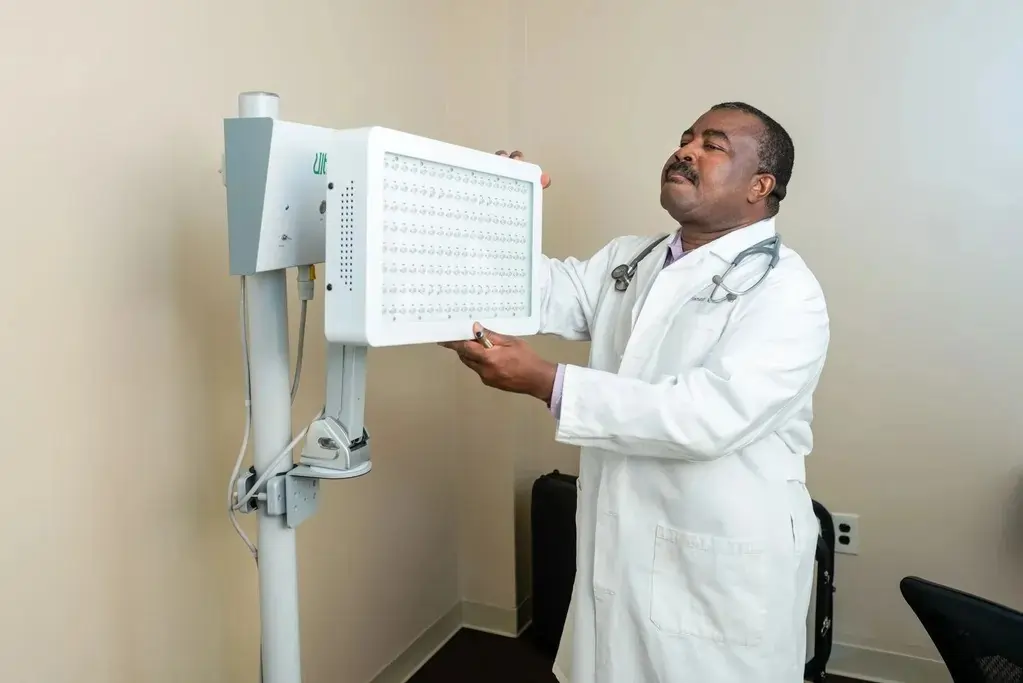
Dr. Ebenezer Quainoo, M.D., CHCQM, is a renowned board-certified internist with over two decades of experience in providing exceptional care in the Baltimore, Maryland area. As the founder and primary care provider at Baltimore Healthcare PC, he offers comprehensive medical services, including primary care, addiction medicine, weight loss treatments, and IV nutrient infusions. His affiliation with the University of Maryland Medical Center reflects his dedication to maintaining high standards of care. Ebenezer Quainoo, M.D., also serves as a Clinical Assistant Professor at the International American University of Medicine, contributing significantly to medical education. In the interview that follows, Dr. Quainoo candidly shares insights into his background, professional journey, and thoughts on the future of healthcare.
Early Career and Inspirations
What keeps you inspired and focused when navigating the pressures of practicing medicine and running a healthcare practice?
What keeps me grounded is the transformational power of patient care. Every time I see a patient recover—whether from addiction, chronic illness, or acute distress—I’m reminded why I chose this path. My faith, my family, and my commitment to providing dignity through medicine anchor me through the pressures of clinical and administrative work.
How did you initially choose the field of internal medicine, and what aspects of it continue to captivate your interest?
Internal medicine appealed to me because of its complexity and comprehensiveness. It requires not only a deep understanding of the human body but also the ability to form lasting relationships with patients. I am continually fascinated by how internal medicine allows for both acute problem-solving and long-term care management.
In your view, what makes Baltimore a unique and meaningful place to serve patients and grow a medical practice?
Baltimore is a city with resilience at its core. The healthcare needs are diverse, the stories are rich, and the opportunity to make a lasting difference is immense. Building trust and providing quality care is both humbling and vital here.
Challenges and Achievements
What are the most pressing challenges you currently face in running your practice, both clinically and administratively?
Balancing patient needs with administrative complexity is an ongoing challenge. From navigating insurance hurdles to responsibly managing the opioid crisis, each decision requires ethical precision. Recruiting and retaining qualified staff while expanding services adds additional pressure, but I embrace these challenges as opportunities to grow our impact.
What single accomplishment stands out as a defining moment in your career so far? Why does it hold personal or professional significance?
Helping a critically ill patient recover from acute renal failure and rhabdomyolysis until they could walk out of rehab stands out to me. That experience reminded me that medicine is about transformation, not just treatment.
How have you balanced your commitment to healthcare quality with other professional responsibilities?
My Healthcare Quality and Management Certification (CHCQM) underscores my dedication to quality. It’s about integrating high standards into every aspect of my practice and ensuring that my team is aligned with those principles. My role involves constant learning and adaptation to lead by example.
Vision for the Future
How do you see the role of private internal medicine practices evolving over the next 5 to 10 years?
I believe we’ll see more private practices adopting hybrid models—combining in-person care with telemedicine and personalized management of chronic diseases. Practices will continue to serve as critical access points for preventive care, especially in underserved communities. The physician-patient relationship will remain at the center of it all.
What recent trend in internal medicine or healthcare delivery do you find most promising or transformative?
I find the increased integration of holistic approaches and data-driven care particularly promising. Combining lifestyle medicine, behavioral health, and evidence-based treatments provides a more comprehensive view of patient wellness. We’re also seeing AI and remote monitoring emerge in ways that can improve access and outcomes.
What guidance would you offer to a medical student or young physician considering a future in internal medicine or independent practice?
Keep the patient at the center of every decision. Independent practice offers freedom, but it also comes with great responsibility. Learn the business side early, seek mentorship, and never stop asking questions. Medicine is a service rooted in humility, curiosity, and compassion.
Personal Reflections
If you could revisit the early years of your medical career, is there anything you would approach differently based on what you now know?
I would have embraced leadership and practice management responsibilities earlier. Clinical excellence alone isn’t enough—you must also be an advocate, an educator, and a strategic thinker to grow a sustainable, impactful practice.
What do you enjoy doing when you're not caring for patients or leading your practice? Are there hobbies or interests that help you recharge?
I recharge by spending time with my family and staying grounded in my faith. I also serve with Mission 195, which allows me to give back globally through medical outreach and spiritual support. That balance keeps me resilient.
Is there a quote, belief, or piece of advice that has stayed with you throughout your journey as a physician and leader?
One belief I carry with me is: “Medicine is not just science—it is service.” That guiding principle helps me approach each patient with empathy and every challenge with integrity. It reminds me that healing begins long before the prescription is written.
Continued Interview with Quainoo: Insights into Expertise and Future Directions in Medicine
What specific expertise have you developed over the years, and how do these skills enhance the care you provide to patients?
Over the years, I've honed skills in musculoskeletal ultrasound, arthrocentesis, central venous line placement, lumbar puncture, abdominal paracentesis, and thoracentesis. These procedures allow me to diagnose and treat conditions more accurately and effectively, directly impacting patient outcomes. My experience in managing chronic conditions like arthritis, hypertension, and bronchitis is strengthened by a patient-centered approach, ensuring comprehensive care tailored to individual needs.
Can you share some key achievements in your career that have significantly influenced your professional journey?
One key achievement is becoming board-certified and obtaining the Healthcare Quality and Management Certification (CHCQM). This has allowed me to advise on physician practices and conduct utilization reviews to maintain high standards of care. Another significant milestone is my involvement in impactful research, like studies on bioprosthetic valve failure and sexually transmitted diseases, which expand my understanding and contribute to informed clinical practice.
How have your contributions to medical education shaped your perspective on healthcare?
As a Clinical Assistant Professor at the International American University of Medicine, I've had the opportunity to influence the next generation of healthcare professionals. Teaching keeps me engaged with the latest developments and challenges my own understanding. It reinforces the importance of patience, empathy, and continuous learning—traits essential for both educators and practitioners.
What are your thoughts on the future of internal medicine and healthcare delivery, specifically in terms of technological advancements?
The future of internal medicine is promising with the advent of AI, telemedicine, and data-driven care. These technologies can transform how we deliver healthcare, making it more accessible and personalized. I foresee an increasing integration of holistic approaches, where lifestyle medicine, behavioral health, and evidence-based treatments come together to provide a comprehensive view of patient wellness.
What role do you believe healthcare quality will play in the evolution of private practice?
Healthcare quality will be central to the evolution of private practice. As regulations tighten and patient expectations rise, maintaining high standards will be critical. Emphasizing quality not only improves patient outcomes but also enhances trust and satisfaction, which are pivotal in sustaining a practice. Continuous quality improvement will be integral as practices adopt more complex hybrid care models.
How do you plan to continue contributing to the medical field in the coming years?
I plan to continue my work in medical education, enhancing the curriculum to include emerging technologies and methodologies. My focus will remain on advancing healthcare quality and exploring new research opportunities. Additionally, I aim to expand Baltimore Healthcare PC’s services, ensuring they meet evolving community needs while maintaining excellence in patient care.
In light of your experiences, what advice would you offer to young healthcare professionals entering the field today?
To young professionals, I would emphasize the importance of balancing clinical skills with leadership and business acumen. Understanding the administrative and financial aspects of practice management is crucial. Always keep the patient at the center of your work, and seek mentorship to navigate the complexities of modern medicine.
Is there a final message you wish to convey to readers about your journey and your vision for healthcare?
My journey in healthcare has been one of continuous growth and adaptation. As we face new challenges and opportunities, I believe the essence of medicine remains unchanged—it is about service, compassion, and integrity. My vision is to uphold these values as we embrace innovation and work towards a more equitable and effective healthcare system.
In conclusion, Dr. Ebenezer Quainoo's extensive experience and commitment to excellence in medicine continue to shape his impactful contributions to the Baltimore medical community and beyond. His vision for the future remains focused on integrating advanced technologies with compassionate care, ensuring that patient well-being is always the top priority.

